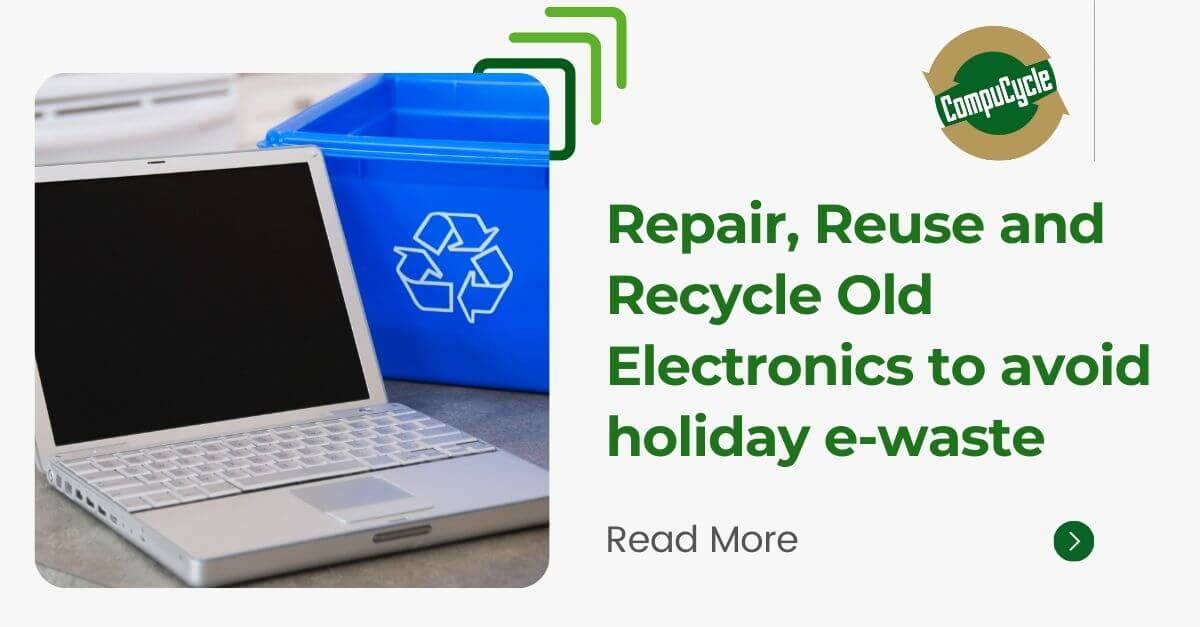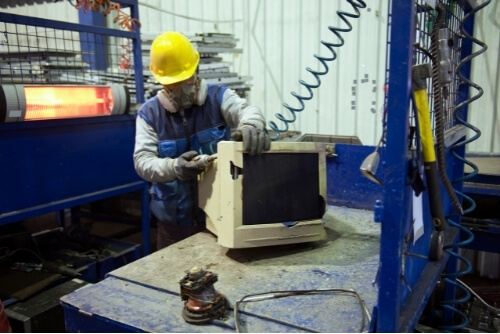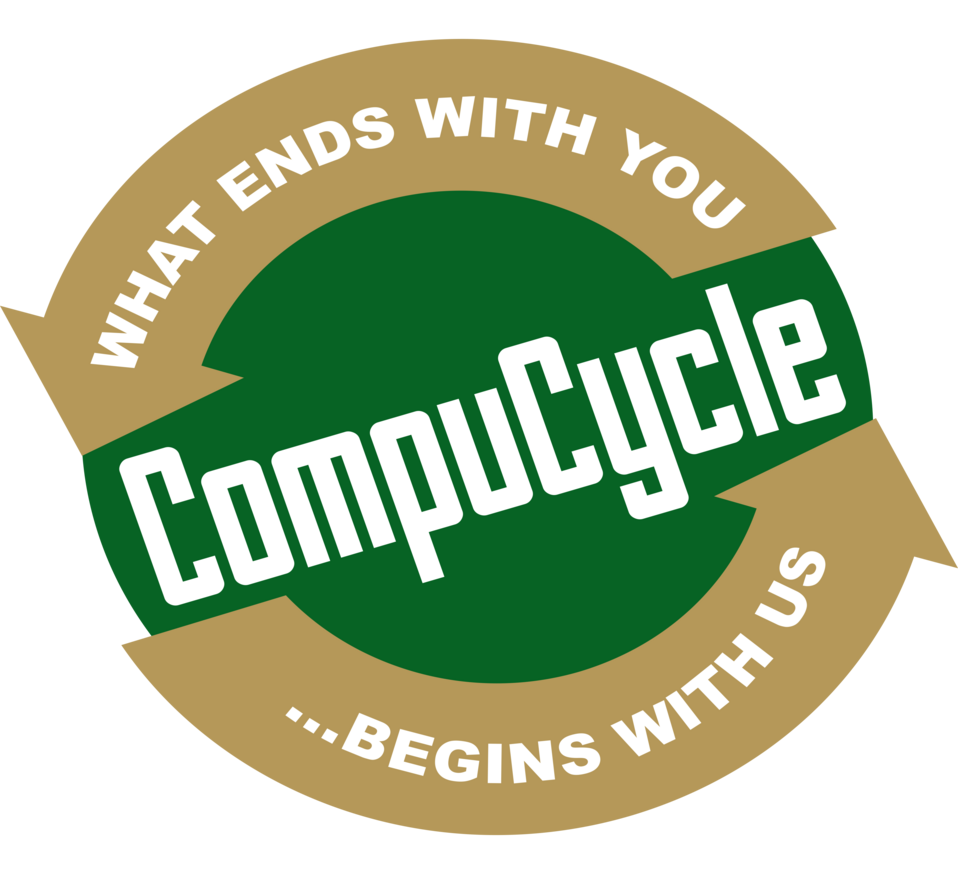
As a result of the holidays behind us, there is always a large consumption for new IT purchases for residents and corporations. With Covid still amongst us, it has continued to be a busy time for TV and computer retailers as people are still working from home and purchasing for personal and business reasons. While you might be triggered to get a new screen or a laptop for yourself to enjoy in the new year, you should know the implications of throwing away your old electronics in the trash. Whether you have personal e-waste or you represent a corporate business, make sure to recycle them to a certified and specialized IT recycling company, like CompuCycle.
You might have heard about responsible IT recycling, but it is common for people to wonder, “Is it worth it or even convenient to recycle?” The answer is a big YES for several reasons. If you do not recycle your IT equipment and throw it away in the trash, it makes its way to different landfills where the harmful substances and materials it contains can contaminate the soil and near water bodies. E-waste has the potential to be extremely harmful to the environment and the natural ecosystem in an extensive manner and fuels climate change and harms natural life. The best way to go about IT recycling is to look for certified IT equipment recycling companies and hand over your e-waste to them for proper and secure IT recycling.
Improper E-Waste Management is Improper Business Management 
Environmental factors aside, a business can be harmed significantly by not seeking assistance from IT asset recycling companies. The reason is that redundant IT assets of an organization have vital information about its business stored on them, and disposing of them improperly can allow the confidential data to make its way into the hands of cybercriminals. This can cause the business to face several penalties and fines in addition to the monetary damage that cybercrimes inflict upon it. Certified and reliable waste IT recycling services perform secure IT recycling to ensure that all the sensitive information stored on all the devices is completely and safely before any unauthorized person can access it. Businesses that opt for responsible IT asset recycling companies also receive proper documentation, reports, and certificates for all the processes applied to their electronics. CompuCycle offers a special Hard Dive Audit Report that documents the hard drive serial number with the parent machine’s serial number.
Repair, Reuse, and Recycle
The best way to ensure that your old electronics do not threaten your business or the environment is to repair, reuse, and recycle them with the help of a certified IT recycling company. Responsible and R2 certified IT equipment recycling companies perform a number of processes on your old devices to keep them from becoming waste.
Repairing
As soon as a certified IT recycling company takes your old IT assets to its facility, it thoroughly tests them in compliance with the R2 testing standards to ascertain if they can be reused. If any of either of the primary or secondary functions of a device can be made to rework, it is refurbished and repaired. Both the testing, as well as the refurbishing processes are recorded.
Reusing
After refurbishing, the electronic devices are remarketed to be resold in the market, and a share of the value it obtains is returned to the customer. The buyers of these IT assets are usually school districts, wholesalers, resellers, and underprivileged countries and communities.
Recycling
The end-of-life electronics that are not reusable are not thrown away but extracted of all the components and value still left in them. This includes the material and components they contain that can be reused. Non-reusable electronics are shredded into small pieces, and materials, such as copper, glass, silver, metal, aluminum, etc. and are then separated and sent to be used in the manufacturing of other different products. This minimizes the need to extract more natural resources, which is a source of carbon emissions and damaging the natural ecosystem.
This way, you can recycle IT assets that are redundant to you and contribute to several causes, including environmental protection, diminishing climate change, preserving nature, safeguarding consumer and employee information, and helping underprivileged communities that aim to make the world a better place. However, not all waste IT recycling services are equal as only R2 certified to ensure all the above processes and in a responsible manner. Get in touch with CompuCycle, an R2 certified, specialized, and highly experienced IT recycling company that performs extremely secure IT recycling. The company offers pickup and drop-off to their facility and has modern and state-of-the-art recycling equipment. For more information, please go to www.CompuCycle.com
Recent Articles
Secure Electronics Disposal in Houston: Why the City’s Largest Industries Trust CompuCycle
When a major healthcare system decommissions thousands of laptops, or an oil and gas company retires an entire data center, one question comes up again and again: What happens to all that data — and…
Read MoreCompuCycle Executives Join R2 TAC and e-Stewards Leadership Council to Advance ITAD Standards
Houston-based ITAD provider deepens its industry influence through active participation in standard-setting committees. As corporate ITAD needs evolve alongside stricter compliance and ESG requirements, CompuCycle continues to lead the way—this time by contributing directly to…
Read MoreI’m Just a Computer: A Journey Through ITAD Recycling
Meet Chip the Computer – he’s about to take you on an unforgettable journey through the world of IT Asset Disposition (ITAD). Buckle up for an adventure that’s both educational and entertaining! Chapter 1: “Hello,…
Read MoreIs There a Wrong Way to Recycle Electronics?
Most people agree that recycling electronics is the right thing to do. It prevents hazardous waste from entering landfills, supports sustainability goals, and allows for the recovery of valuable materials. But what many businesses don’t…
Read More


